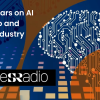EBU Academy School of AI
EBU Academy School of AI is an evolving curriculum of classes to strengthen AI literacy and upskill Europe’s public service media workers. Vitally, it encourages critical thinking because the trust that EU citizens put in their public media is more precious than ever in an age of disinformation.
About the initiative
Artificial Intelligence is transforming public service media across Europe. According to a recent EBU internal survey (May 2025), over 75% of EBU Members are already using AI, and more than half have embedded it into their corporate strategies. AI is not just a technological upgrade. It is a disruptive force that brings both immense opportunities and serious challenges to our sector and society.
To help public media professionals navigate this shift, the EBU Academy School of AI was launched in March 2024. And its mission is to provide inclusive, future-focused education that empowers all roles within public service media to understand and use AI responsibly.
The school’s evolving curriculum focuses on two key areas:
- AI Literacy: Teaching the fundamentals of data, algorithms, and ethical issues such as bias and transparency.
- Upskilling: Offering hands-on training in AI tools, from basic and advanced prompting to AI-assisted editing and production.
Beyond technical skills, the School of AI fosters critical thinking around the ethical use of AI, helping safeguard the trust that audiences place in public service media. It also strengthens resilience by offering training on cybersecurity and countering disinformation.
This initiative is powered by collaboration, drawing on expertise from EBU’s Technology & Innovation department, social newsgathering teams combating deepfakes, and pioneering Member organizations across the EU. Together, we ensure the school remains agile and relevant in a fast-changing landscape.
Why is it a good practice?
The EBU Academy School of AI stands out as a model of excellence in digital education for public service media, offering a forward-thinking, inclusive, and impactful approach to AI literacy and professional development. Launched with the mission to become a “one-stop shop” for AI learning, it has successfully created a centralized, accessible hub for media professionals across Europe and beyond, regardless of their starting point in the AI journey.
This initiative is particularly commendable for its multi-dimensional strategy:
- It supports AI literacy and upskilling through tailored, high-quality courses that evolve alongside technological advancements, ensuring relevance and sustainability.
- It responds to real-world needs, with bespoke training commissioned by national broadcasters such as HRT (Croatia), RTE (Ireland), and Sveriges Radio (Sweden), and extends its reach globally through partnerships.
- It fosters collaboration and knowledge exchange, organizing events like the Learning and Development Day, where public media professionals share strategies and tools for AI education.
- It champions accessibility and inclusion, offering a mix of free and paid activities, using AI-powered transcription and translation tools to break down language barriers and support learners with hearing disabilities.
- It embraces environmental sustainability, prioritizing live online learning to reduce travel-related emissions and planning future courses on AI’s role in environmental responsibility, and it promotes gender balance.
- It measures impact through quality. It has received positive feedback from learners who appreciate the accessible, non-technical approach to complex AI topics.
School of AI provides a trusted, strategic resource for continuous learning and its commitment to adaptability, equity, and excellence makes it a good practice in digital skills development, worthy of recognition and emulation.






